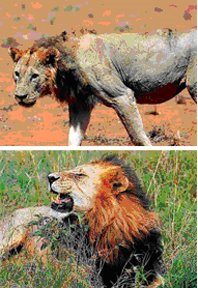
Source: Science NOW Daily; By Brendan Borrell. 29 Sept. 06
http://sciencenow.sciencemag.org
The male lion's magnificent mane sets him apart from other cats--and it's a great charmer for the ladies--so why would he do without it? That question has puzzled scientists since 1833, when the first reports of "maneless" lions trickled in from around the world. Now, a research team reports that lions from the Tsavo region of Kenya deliberately delay mane growth to cope with the region's harsh temperatures.
John Patterson, an avid hunter and a British Colonel, was one of the first to document manelessness in Tsavo's legendary man-eaters. Ever since, naturalists have developed evolutionary scenarios that would have made Rudyard Kipling proud. Some researchers suggested that lions lost their manes because they were snagged too many times in Tsavo's ubiquitous thorn scrub. Others argued that Tsavo's aggressive lions have unusually high testosterone levels, known to cause male pattern baldness in humans. Still others proposed that Tsavo's lions were a distinct subspecies or were related to an extinct lion pictured in prehistoric caves.
But zoologist Thomas Gnoske at the Field Museum in Chicago, Illinois, considered something these speculators didn't: lions shipped to zoos in cooler climates grow longer manes. This made him wonder whether hot temperatures account for Tsavo's thinning tomcats. To find out, Gnoske and colleagues studied museum specimens and conducted 10 years of fieldwork in Tsavo and in the Serengeti, which is about 10 degrees cooler. In an article published online this month in the Journal of Zoology, the team reports that lions in the Serengeti grow a full mane in 5 years--by the time they're ready to breed--but that Tsavo's lions don't have much of mane until age 8, well past their reproductive prime.
Gnoske thinks smaller manes improve a young, vigorous lion's ability to keep cool. Bushy manes probably evolved to attract females in cooler climates where heat stress was not an issue, Gnoske says, and lions can't just turn off that program, now that they're in a place like Tsavo. "They're hard-wired to grow a mane, period, and they'll develop as large of a mane as they possibly can."
Mammalogist Roland Kays of the New York State Museum in Albany says he is surprised by the delay in mane development. However, he expresses concern about the accuracy of using field observations to estimate the age of Tsavo's lions. Gnoske says his team is currently focusing its research on Tsavo lions with known birth dates, but it will be a challenge to keep track of the wide-ranging animals through maturity, especially since radio collars are prohibited in Tsavo's national parks.
Find Everything about ASIATIC LION & GIR at www.asiaticlion.org
or contact info@asiaticlion.org
--------------------------------------------------------------------------------------
No comments:
Post a Comment